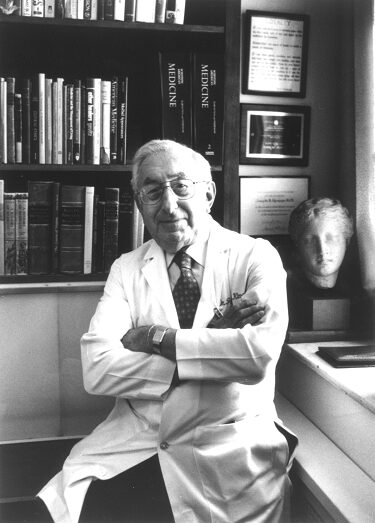Joseph B. Kirsner*
Class of 1979
- Louis Block Distinguished Service Professor of Medicine The University of Chicago Hospitals and Clinics

Humanitarian goals, total commitment, and perseverance equal success in medicine and in life.
Born in Roxbury, Massachusetts, in 1900, Joseph Kirsner learned about hard work early. The son of poor Russian immigrants, he sold newspapers and worked in a grocery store, a shoe store, and the public library. A series of routine childhood illnesses and injuries brought him into contact with doctors and sparked his interest in medicine.
After graduating from Boston English High School in 1927, he enrolled in Tufts University's six-year combined premedical-medical program. "My father sold his life insurance policy for $200 to pay for half my first year's tuition," he recalled. Continuously pressed for money, Kirsner sorted mail and labored as a handyman from dawn to dusk at two different jobs each summer.
After graduating near the top of his class, he took an internship at Chicago's Woodlawn Hospital that paid $25 a month. In 1935, Kirsner accepted his first staff job at the University of Chicago's Department of Medicine. A year later, he joined a unit at the university's newly formed specialty of gastroenterology, the study of digestive diseases.
Kirsner retired in 2004 after a 69-year career, at the age of 95. He helped build the University of Chicago Medical Center into the leading U.S. gastroenterology clinic. Kirsner received numerous awards and honors, including the title of Lincoln Laureate of Illinois, the highest honor given to a citizen of the state. In addition, he received the American Gastroenterology Association's Distinguished Educator Award in recognition of his research, training, and education of generations of academic and practicing gastroenterologists. The University of Chicago Medical Center established the Joseph B. Kirsner Center for the Study of Digestive Diseases, which opened in 1986.
Kirsner had always been very proud of his Horatio Alger Award. "When I was a boy in Boston, I read all the Horatio Alger stories. I've been a fan of that concept from the time I could understand it." When asked to define success, Kirsner said that his contributions to society as a physician and educator mark his success. "We are here for the sake of others, known and unknown. We must constantly strive to give as much as or more than we have received."
